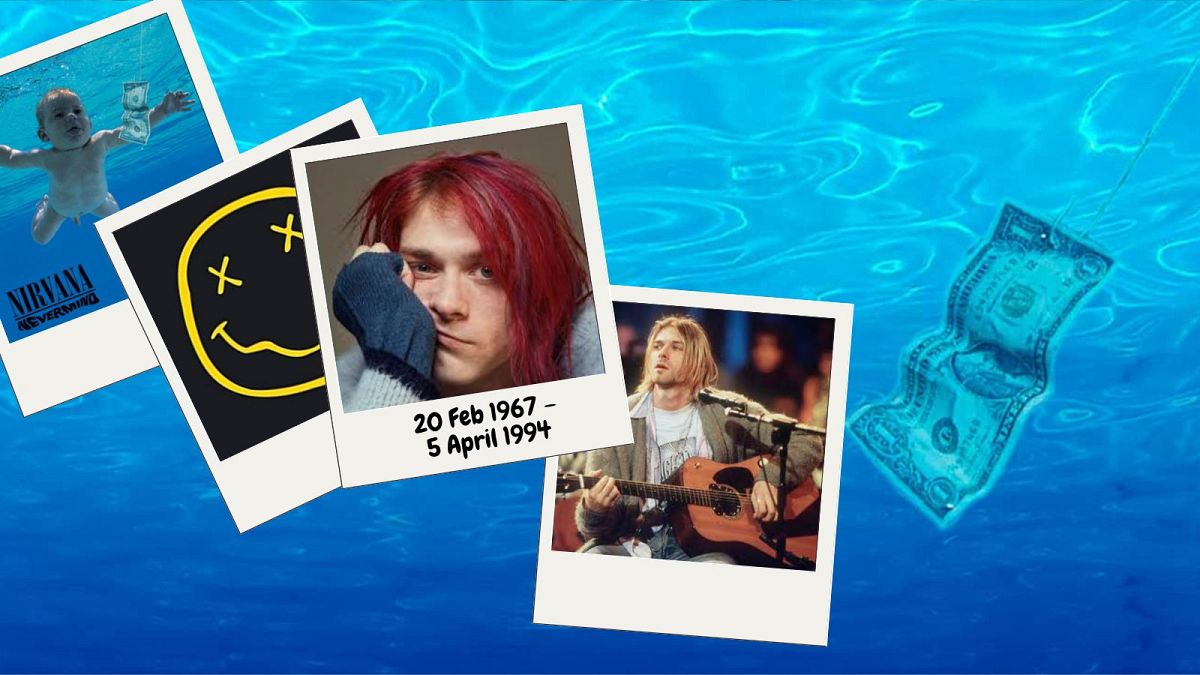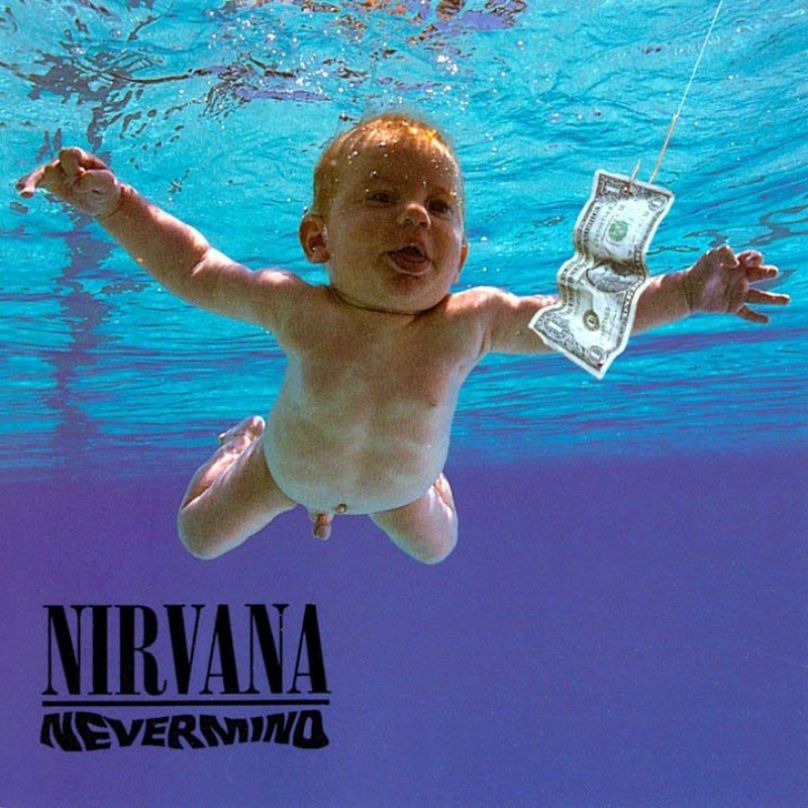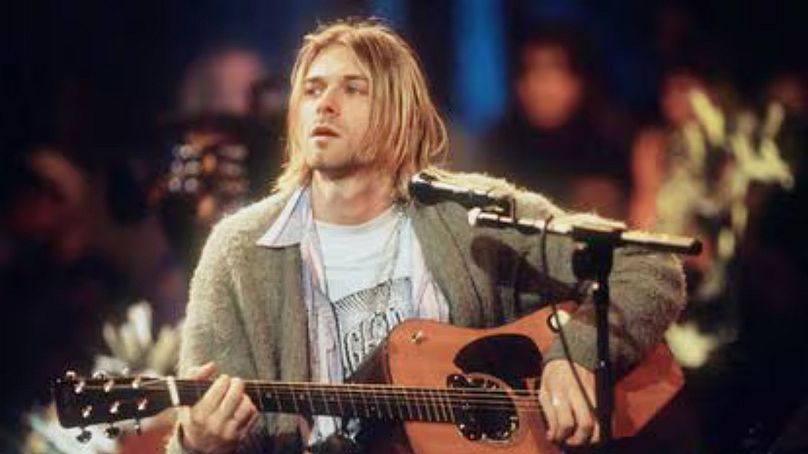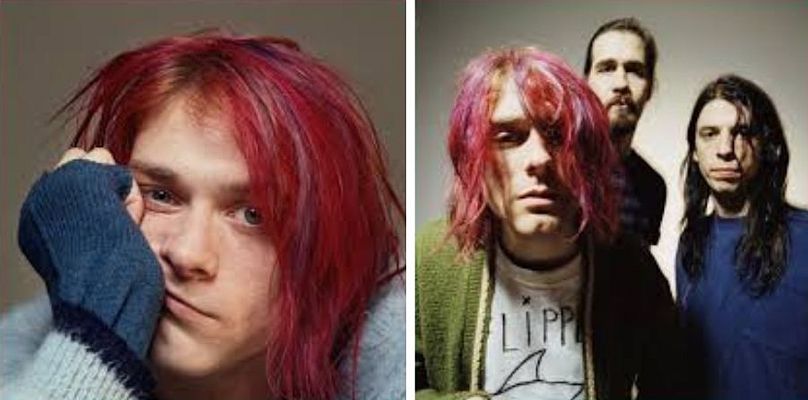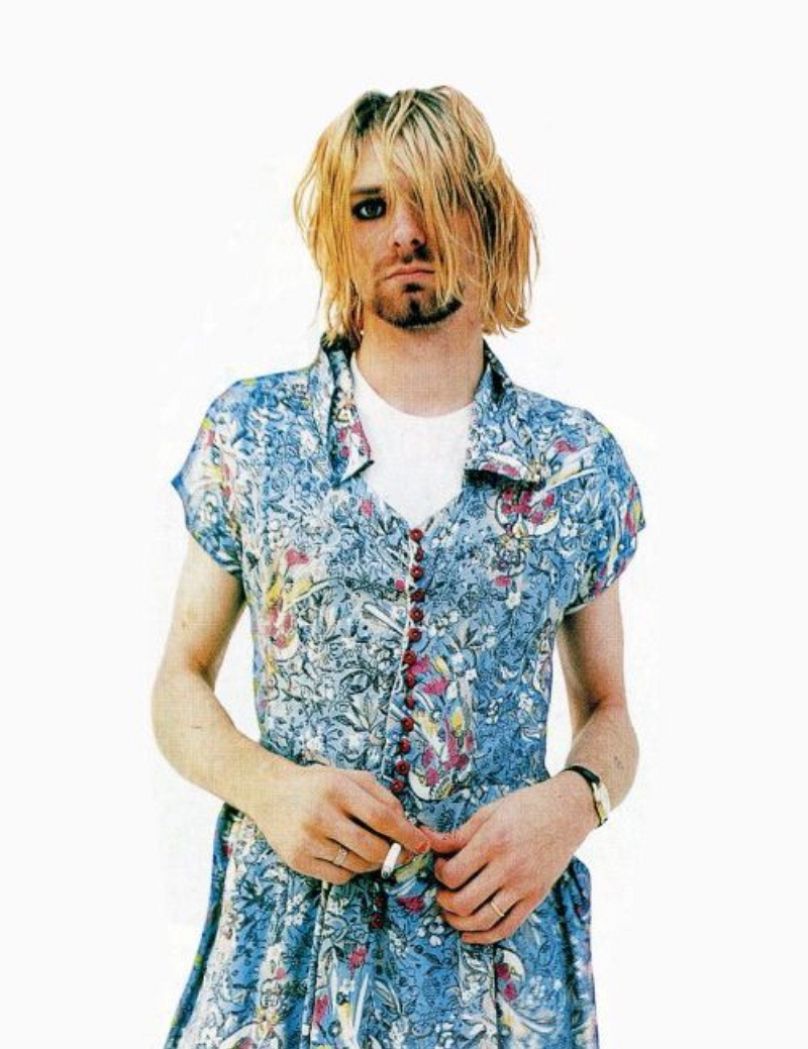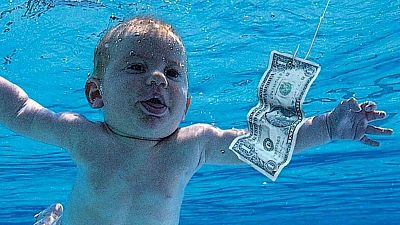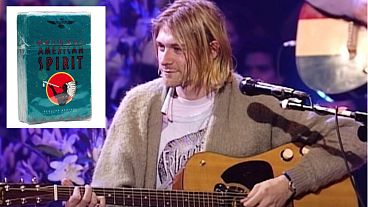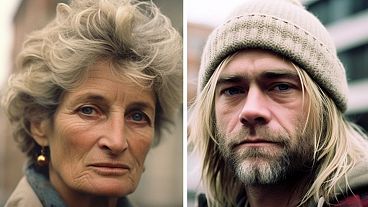Kurt Cobain died 30 years ago today, and on the anniversary of his death, Euronews Culture’s David Mouriquand dwells on an often-overlooked aspect of Nirvana’s generation-spanning legacy: social activism and the importance of staying true to oneself.
I was nine years old when I learned of Kurt Cobain’s death.
At that time, all I knew about Cobain was Nirvana’s ‘Smells Like Teen Spirit’ being played on repeat on MTV, and the striking image of a naked baby swimming for a dollar on the 'Nevermind' poster taped to my neighbour’s bedroom wall.
I always looked up to my neighbours, siblings who are respectively three and five years older than me – an age gap which was a huge deal for a younger me with little to no cool factor to speak of. They were my cool factor, the gatekeepers to know-how I lacked.
Both brothers frequently took me under their wing: taking me out, helping me pick out what to wear for those all-important school discos, teaching me how to inhale with my first cigarette, and introducing me to bands and music genres that weren’t being played in my household.
It was the eldest brother who had the ideal teenage boy’s grotto, a room I’ll never forget. It was shelved with countless CDs, cassettes, and 18-rated VHS tapes that I wasn’t old enough to watch. It felt like a haven of indie-punk cred, plastered with wonky overlapping gig posters, scantily clad rock chicks flipping the bird at the photographer... and images of Kurt Cobain.
He was in tears when the news broke, and prepubescent me didn’t quite get it. I was just stunned to see him cry, unsure where to place myself. In the end, the three of us stayed in his room listening to the entirety of 'Nevermind' on CD, followed by 'In Utero' on cassette tape.
Looking back, it was probably the best way of honouring Kurt’s memory.
In the years that followed, I would go on to measure what his death meant to so many, as well as grasp the circumstances of his passing – something a nine-year-old with no real knowledge of drug addiction or depression could have done.
I began to understand why Seattle radio stations had declared Kurt’s death as the day music died, slowly grasping the impact Nirvana’s second album 'Nevermind' had on an American generation emerging from the 80s and that era's constant cultural shows of Reaganite capitalism and American exceptionalism brainwashing. I attempted to make sense of fandom – with one specific image of a woman who had carved the letters K-U-R-T into her arm also chiselled in my mind. I started to appreciate the emotional weight of the numerous images of fan vigils, realising that these candlelit events happen for every generation, like John Lennon or Elvis Presley before him.
Years later, when living in Berlin, I too would attend a similar vigil, this time for the death of David Bowie – and images of Kurt’s didn’t seem so far.
I went on to listen to the albums repeatedly – with a particular fondness for the 'MTV Unplugged in New York' live album. I also read extracts from Kurt’s diary, lingering on his handwritten suicide note that I scrutinised over and over again. There came a time when I would even analyse it line by line, as if to pick up a clue or somehow gain a better understanding as to what had happened. I too wondered whether those final lines were subsequently added by Courtney Love – who was rumoured to have had her husband killed.
Not that I ever gave much credence to the conspiracy theories surrounding Kurt's death, despite falling down the 27 Club rabbit hole, and appreciating Nick Broomfield’s documentary Kurt And Courtney, which delved into Kurt’s untimely death and the dark accusation that Love may have played a sinister role in his passing. For me, the conspiracies surrounding Kurt’s suicide were just an expression of pain and grief, with countless trying to make sense of how such a talented but tortured young man could take his life like that. Instead of accepting the unfathomable, people have the tendency to lash out.
His death was a shock but also made him into an icon, soldering him to pop culture history and making his legacy last decades longer than his career.
An icon of what?
A musical one who had thrust indie rock into the mainstream and whose lyrics resonated with those who felt seen and heard by his angst.
An unwitting and unwilling fashion icon, who inspired countless rebellious outfits and grunge looks, which are coming back today in a big way – and made me value the importance of a good cardigan from a very early age.
Above all, a subversive generational icon, as Gen X had lost its prince in 1994.
This particular aspect fascinated me in its contradictions.
I’d watch interviews of Kurt disdainfully brushing off the title of “voice of a generation” and calling out corporate mediatisation, telling interviewers that he struggled to reconcile the success of Nirvana with his underground roots. He became an unlikely poster boy, a recalcitrant figurehead who resented people who claimed to be Nirvana fans but misinterpreted the social and political views he championed.
This could be seen in his unshowy social activism, something that I have continued to love about Kurt and which, for me, may be his and Nirvana’s most enduring legacy.
There’s only so much I can write about it, conscious of how long I’ve already prattled on. Examples that have marked me are his vocal opposition to sexism, racism and sexual assault, as well as his support for the queer community.
In the liner notes to 1992’s 'Incesticide', he wrote: “If any of you in any way hate homosexuals, people of different color, or women, please do this one favor for us – leave us the fuck alone! Don’t come to our shows and don’t buy our records.”
Couldn’t be clearer.
This social activism often gets overlooked or misunderstood in some of the band’s songs. For instance, the controversy-stirring ‘Rape Me’ is an anti-rape song, and ‘Been A Son’ saw Kurt reflect on the biases he saw against women by adopting the voice of a misogynist father figure.
There’s even a clip which surfaced online of Kurt stopping mid-gig to call out an audience member for groping another.
Kurt and the band were also outspoken on homophobia, and some could legitimately say ahead of their time.
He was publicly proud that Nirvana had played at a gay rights benefit concert that was held to oppose Oregon's 1992 Ballot Measure 9, which would have directed Oregon schools to teach that homosexuality was "abnormal, wrong, unnatural and perverse."
This may not seem like much now, but at the time, few rock bands like Nirvana dared to speak out without fearing fan alienation or damaging a certain rock image through a loud and proud advocacy of feminism. Nirvana championed the more underground Riot Grrrl acts which had not enjoyed the same level of mainstream recognition, and Kurt even said he wished he’d been gay just to piss off homophobes. He often wore dresses to protest against homophobia and sexism.
"Wearing a dress shows I can be as feminine as I want," he told the LA Times, in a jab at the macho undercurrents he loathed in the rock scene, and which he subverted and often satirized.
"I'm a heterosexual... big deal. But if I was a homosexual, it wouldn't matter either."
He also admitted to spray-painting “God is gay” (a line that would later pop up in the Nirvana song ‘Stay Away’) in his hometown of Aberdeen.
He also repeatedly stated that he had no time for any form of apathetic behaviour – something that had characterized Gen X in the eyes of older generations.
“I'm disgusted by my own and my generation's apathy. I'm disgusted at what we allow to go on, by how spineless, lethargic and guilty we are of not standing up against racism, sexism and all those other 'isms' that the counterculture has been whining about for years while they sit and enforce those same attitudes every night on their televisions and in the magazines."
I singled out this quote because it reinforced my continuing belief that apathy is the biggest enemy to progress, and because it reveals that Kurt was maybe not the voice of a generation he didn’t wish to be, but was certainly a compassionate and eloquent observer of the times he lived in. And, as it turns out, the times we live in now, as he unknowingly anticipated modern attitudes and started conversations that are still happening today.
30 years after his death, choose to dig out some archive interviews, and many of his quotes about gender stereotypes and gendered clothing, for example, couldn’t sound more contemporary.
On the 30th anniversary of his death, I don’t choose to put Kurt Cobain on a pedestal. He was a flawed individual, like we all are in our unique ways. Nor do I endorse some of his lifestyle choices, judge his action to end his life, or fail to recognise the deeply problematic exploitation of his mental health through the years.
However, I choose to remember what the rocker means to me; how he stuck to his integrity, mocking trends and shattering oppressive consensus about what a person should be. He proned certain crucial things that I’d love my young nephew’s generation to embrace: understand the times without bending to the mainstream; allow yourself to be vulnerable and mindful of others; wear what you want to wear as long as it makes you happy; and above all, be your authentic self on your own terms.
No one succeeds every time, but it's advice that empowers.
“If chasing cool is important to you, you're an idiot!", Kurt said in a 1991 interview.
Blunt words, but liberating ones, as being a teenager is hard – and it was made easier for me reading his quotes in my teen years. I thank him for that. And I thank my neighbour, whose bedroom grotto I’ll live in today as I commemorate an artist who inspired his generation, still speaks to this current one, and who will hopefully resonate with future ones.
When he’s old enough - maybe nine like I was - I hope I get to introduce my nephew to Nirvana. I'll even pass on my 'Nevermind' poster, in hopes he too might appreciate Kurt and Nirvana’s indelible mark on music and society. And that his generation will have an easier time of it. All apologies if not.
Kurt Cobain - 20 February 1967 – 5 April 1994.
